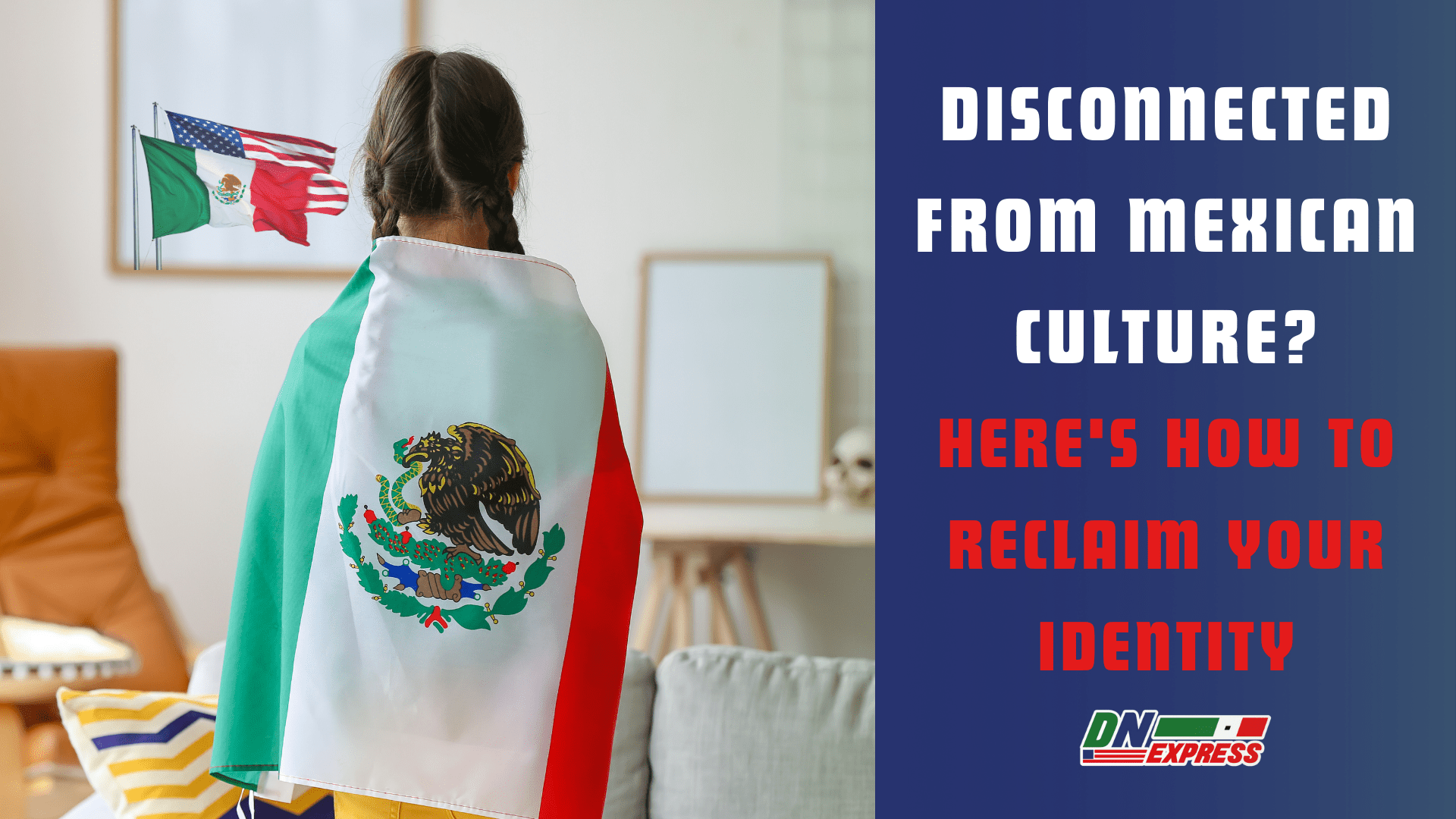If you've ever felt too American for Mexicans and too Mexican for Americans, you're part of a larger community. Many people wrestle with guilt, confusion, and shame over losing their roots, especially if they don't speak Spanish, never visited Mexico, or were raised far from Latino communities.
The good news? There's a path back.
This article breaks down the genuine reasons cultural disconnection happens, from family silence to school microaggressions, and how you can legally and emotionally reclaim your identity.
We'll also explore how dual citizenship can help you feel like you truly belong on both sides of the border.
Doble Nacionalidad Express helps thousands of Mexican-Americans take this journey without consulates, confusion, or judgment. If you've ever been told “you don't qualify,” we're here to prove that you do with a consulta gratis.
Want to understand how this all works and what to do next? Keep reading.
How Cultural Disconnection Looks for Different People
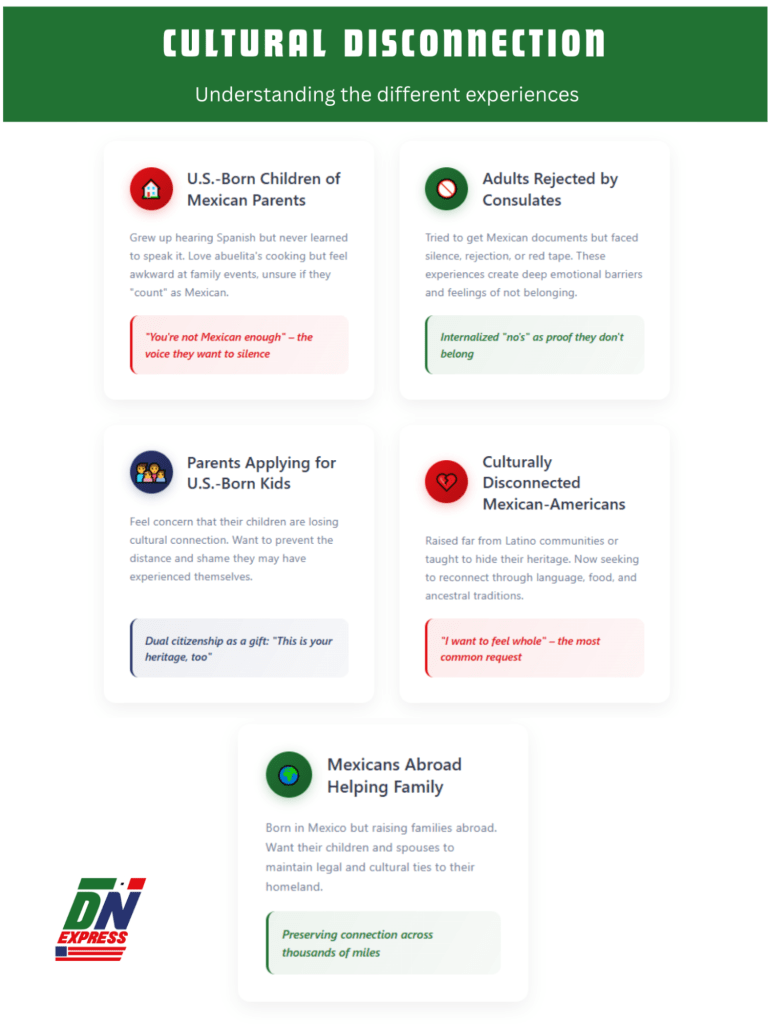
Cultural disconnection doesn't look the same for everyone. Depending on your background, where you were raised, or what your family shared (or didn't share), the pain of feeling detached from your roots can take different forms.
Here are some of the most common and often overlooked situations we see:
U.S.-Born Children of Mexican Parents
You grew up hearing Spanish in the background, but maybe you never learned to speak it. Or your parents told you stories of their pueblo but never brought you to visit.
You might love your abuelita's cooking but feel awkward at family events, unsure if you “count” as Mexican.
Many clients in this group come to us because they want to reconnect with their birthright, not only emotionally, but legally. Applying for Mexican citizenship is their way of honoring their family and finally silencing the voice that says: “You're not Mexican enough.”
Adults Rejected or Ignored by the Consulate
Some people tried to get their Mexican documents years ago and were met with silence, rejection, or red tape. Maybe they were told they needed their parent's consent or that they were too old.
These rejections don't create legal barriers alone; they cut deep.
We've met hundreds of people who internalized those “no's” as proof that they don't belong. But we're here to tell you: it wasn't your fault. And you absolutely can try again, this time, without the consulate.
Research shows that Mexican American identity development is complex and often affected by external barriers like consulate rejections.
Parents Applying for Their U.S.-Born Kids
Many parents feel a quiet ache knowing their kids are losing the culture they grew up with. They don't want their children to feel the same distance or shame they once felt.
So they take action.
For these parents, dual citizenship goes beyond paperwork; it's a gift. A passport that opens doors to their homeland, a document that says: “This is your heritage, too.”
Culturally Disconnected Mexican-Americans
This group is often caught in the hardest place emotionally. Maybe you were raised far from other Latinos.
Maybe you grew up thinking Spanish was “bad” or Mexican culture was something to hide.
Now, you're older. You want to learn the language, cook the food, visit the towns your parents never talked about. You want to feel whole.
That's what we hear, over and over again: “I want to feel whole.”
For many, reclaiming citizenship becomes a turning point, a legal way to say, “I belong.”
Mexicans Abroad Helping Their Spouses or Children
Even for those born in Mexico, cultural detachment can happen when you raise a family in another country. We meet many Mexican citizens living in the U.S. who want their children born in the US or spouses to be legally and culturally tied to Mexico.
They don't want their families to lose that connection. They want their loved ones to feel the same pride, the same identity, even from thousands of miles away.
What Does It Mean to Feel Disconnected from Mexican Culture?
Disconnection from Mexican culture doesn't always look like rejection; sometimes, it's quiet. It's the ache of not understanding your grandparents.
The awkward pause when someone greets you in Spanish and you freeze. The way your last name is pronounced wrong at school, over and over, until you stop correcting people.
For many of our clients, disconnection is a slow, silent erosion of belonging. The National Museum of the American Latino documents how this experience affects millions of Latino families across generations.
You might relate if:
- You never learned Spanish or forgot it because no one else around you spoke it.
- You grew up in a predominantly white town, with no quinceañeras, no pan dulce shops, no Spanish-language TV.
- You've been called “pocho” or told you're “too white to be Mexican.”
- You love your heritage but feel like an outsider at cultural events, like you're performing something you never fully learned.
- You've avoided claiming your Mexican side out of fear that someone will challenge you on it.
These feelings often lead to deeper questions:
“Am I even allowed to call myself Mexican?”
“What if I'm performing something I never was?”
“Will I ever truly belong anywhere?”
If that's you, know that you share these feelings with thousands of others. We've spoken to countless Mexican-Americans who share these exact fears.
And here's what we always say: You're not broken. You're not fake. You're part of a generation that was taught to survive, often by leaving parts of itself behind.
The good news? It's not too late to reclaim what was yours all along.
Common Reasons Why This Disconnect Happens
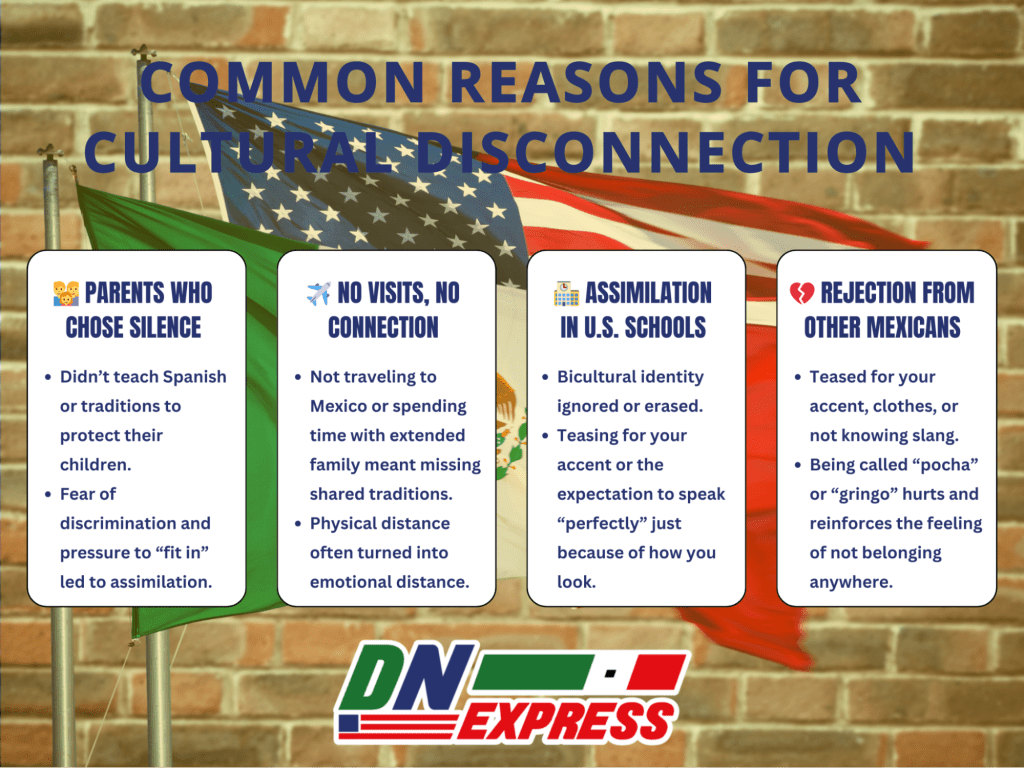
Cultural disconnection doesn't happen by accident. It's not a personal failure or something to be ashamed of; it's often the result of forces outside your control.
The more stories we hear, the clearer it becomes: disconnection is something many of us inherited.
Parents Who Chose Silence
Many parents chose not to teach their children Spanish or Mexican customs, not because they didn't care, but because they were trying to protect them. For families who experienced discrimination, language barriers, or fear of “not fitting in,” assimilation felt like survival.
Some were told by teachers or employers that Spanish had “no place in America.” Others believed that raising children in English would help them succeed.
Over time, that silence created a gap, one that many of our clients are now trying to close.
No Visits, No Connection
If you never visited Mexico as a child or didn't grow up around extended family, you may have missed out on shared traditions. Holidays, hometown stories, Indigenous ancestry, even something as simple as hearing Spanish in the kitchen… all of that matters.
Distance becomes emotional too, not only geographic.
Assimilation in U.S. Schools
The American school system doesn't exactly nurture bicultural identity. In many districts, cultural identity is treated as an extracurricular at best, or erased at worst.
You may have grown up pledging allegiance to one flag while your family clung to another in silence.
We've heard from clients who were mocked in Spanish class for having the “wrong accent” or expected to speak perfectly because they looked Mexican.
Rejection from Other Mexicans
One of the most painful and rarely talked about experiences is being rejected by Mexican nationals. We've worked with people who finally visited Mexico, only to be teased for their accent, their clothes, or not knowing local slang.
Being called “pocha” or “gringo” by your own people cuts deep. It confirms a fear that many carry silently: “Maybe I'm not welcome anywhere.”
We know that reclaiming your culture takes courage, and we meet every client with patience, compassion, and the legal tools to help them reconnect with their roots, no matter where they're starting from.
How Mexican Dual Citizenship Can Reconnect You
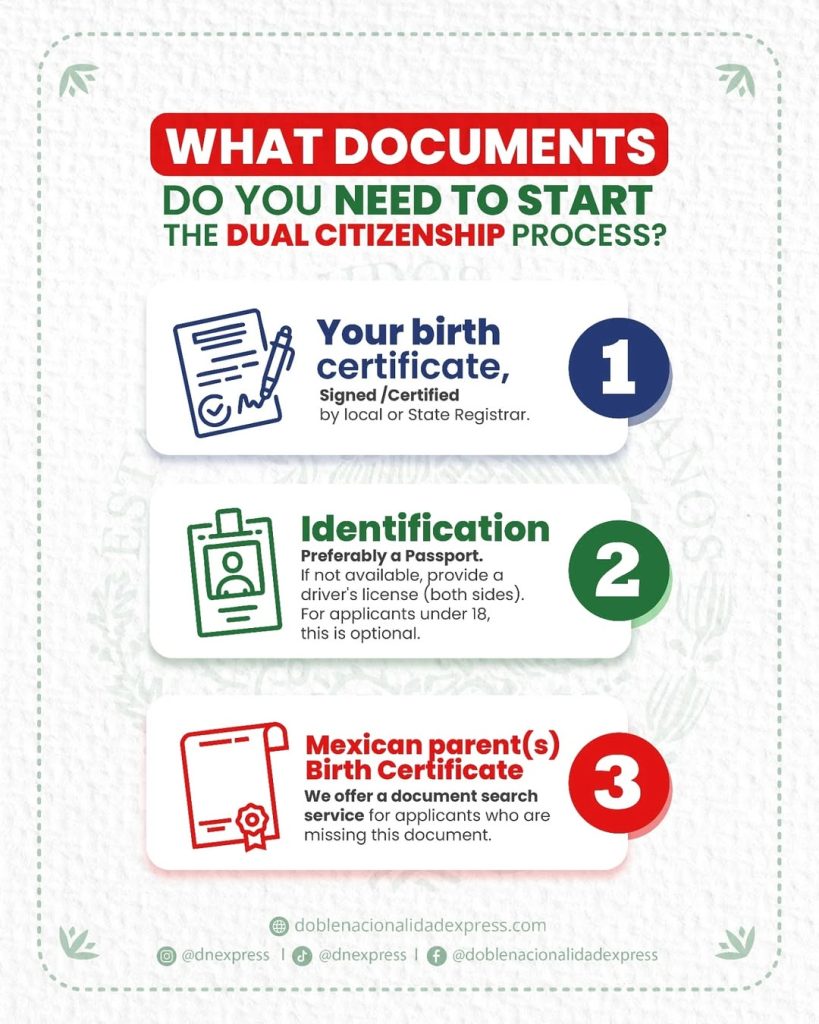
For many Mexican-Americans, the path back to identity starts with one powerful act: reclaiming their legal right to Mexican citizenship.
You may have grown up feeling unsure of where you belong. You may have questioned if you're “Mexican enough.”
But the truth is, if you have at least one Mexican parent, the right to citizenship is already yours. It's not something you have to earn; it's something you're entitled to claim.
And that legal recognition can change everything.
Legally Reclaiming Your Birthright
Applying for Mexican dual citizenship goes beyond travel or documentation; it's about recognition. It's a way of saying: “I belong to this story. I'm part of this lineage.”
You don't need to be fluent in Spanish. You don't need to live in Mexico.
And you don't need anyone else's permission to apply, not even your parents.
Strengthens Your Family Bonds
When one person in a family reclaims their citizenship, something shifts. We've seen it spark deeper conversations with relatives.
We've seen grandparents cry. We've helped siblings, cousins, and even full family trees reconnect through the simple act of applying for what was always theirs.
Even if your relationship with family is distant or complicated, having that legal tie to Mexico can serve as a cultural and emotional bridge.
Unlocks Practical Opportunities
With Mexican citizenship, you gain access to:
- A Mexican passport
- Rights to vote or own property in Mexico
- The ability to live, work, or study in Mexico without a visa
- The right to pass citizenship to your children
But even beyond those legal benefits, the biggest gift is emotional closure.
Emotional Insight: For many of our clients, getting that citizenship certificate feels like Mexico itself is saying: “You are one of us. Welcome home.”
Is It Too Late to Reconnect?
Absolutely not.
You haven't missed your chance. You're not too old.
And you're definitely not too far removed to find your way back. Reclaiming your culture doesn't require a perfect accent, a Mexican birth certificate, or a trip to your family's hometown.
It requires intention and a little courage.
You Can Learn Spanish as an Adult
We've worked with clients in their 40s, 50s, even 70s who started learning Spanish from scratch. You don't have to be fluent to be legitimate.
Language is a tool for connection, not a test of worth.
You Can Reclaim Citizenship Without Your Parents
Even if your parents never filed paperwork or you feel like it's “too late,” that door remains open. You don't need them to apply on your behalf.
If one of them was born in Mexico, you have the right to citizenship, and we can help you get it. Many people also benefit from Mexican American Studies programs that help them understand their heritage while pursuing citizenship.
You Don't Have to Travel to Mexico
Thanks to remote legal services like ours, you can complete the entire process from the U.S. There's no need to fly across the border, wait in consulate lines, or navigate it all alone.
Cultural Identity Means Connection, Not Performance
Whether you grew up with rancheras or hip-hop, tamales or grilled cheese, your heritage remains yours. You don't have to “act” Mexican to be Mexican.
Insight: Many of our clients cry when they receive their nationality, not because of the paper, but because of what it represents.
It's proof that they belong. That they count. That they've come home.
Why You Shouldn't Do It Alone
We know you're capable, but when it comes to securing Mexican citizenship, doing it yourself doesn't always make the most sense. What seems like a simple process on the surface often turns into a stressful maze of untranslated documents, outdated consulate rules, and legal gray areas.
Here's what we see all the time from clients who came to us after trying the DIY route:
Confusing Paperwork
Mexican legal documents, especially birth certificates, CURPs, and apostilles, must follow strict formats. A single mismatch in spelling, date, or parental information can derail the process.
Untranslated Requirements
Many of the instructions and requirements are only available in legal Spanish. If you're not fluent in legalese, it's easy to misunderstand what's needed and miss a deadline or critical step. Our certified translation services ensure all documents meet legal requirements.
Delays That Can Stretch for Months
One typo or missing document can lead to 3-6 month delays, sometimes longer. We've seen people wait years to correct errors that could have been avoided with proper guidance.
The Consulate Experience
Let's be honest: getting through the Mexican consulate system can feel like trying to win the lottery. Appointments are limited, staff can be unhelpful or dismissive, and the whole experience often leaves people feeling humiliated or unworthy.
Many of our clients gave up halfway through, not because they didn't qualify, but because the system made them feel like they didn't.
One Wrong Form Can Cost Everything
Citizenship applications are not forgiving. One form filed incorrectly or one name spelled wrong can get your entire application rejected.
No refund. No appeal. Nothing but wasted time and emotional exhaustion.
That's why we started Doble Nacionalidad Express, to take all of that stress off your plate and guide you with empathy, accuracy, and experience.
When you're ready, we'll be here to walk every step with you, start to finish.
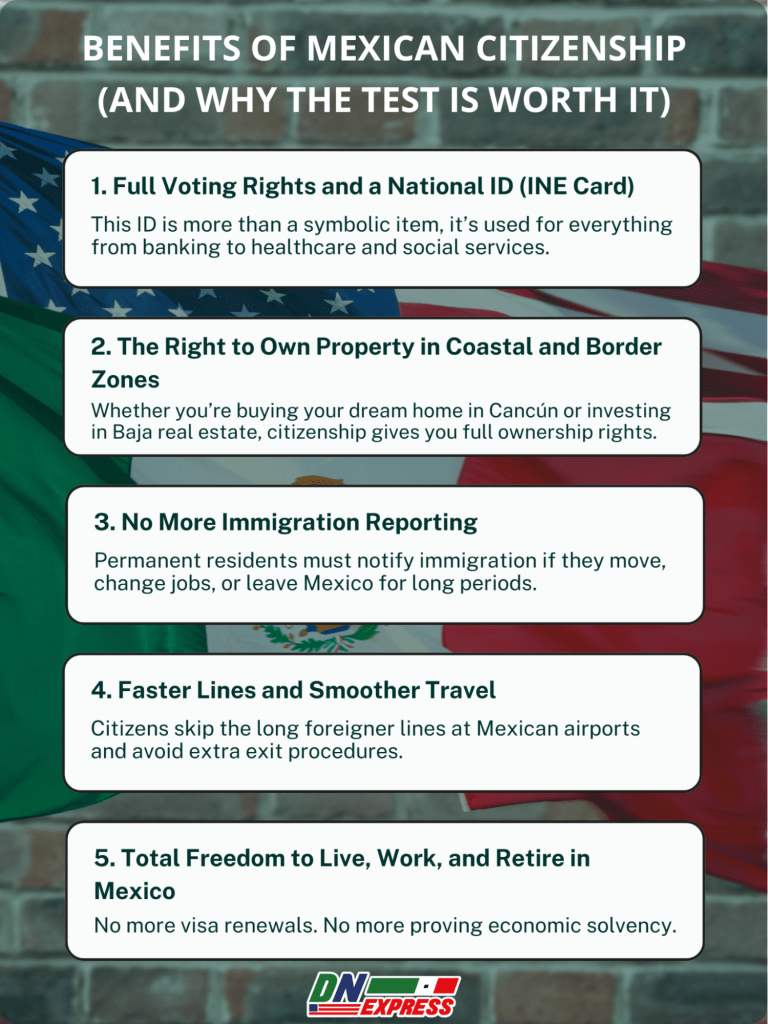
Why Doble Nacionalidad Express is the Right Partner
When we founded Doble Nacionalidad Express, it went beyond paperwork; it was about justice. We saw too many people turned away, ignored, or overwhelmed by a system that made them feel like they didn't belong.
We knew there had to be a better way.
That's why our entire process is built around making dual citizenship accessible, respectful, and stress-free, no matter where you're starting from.
Here's what makes us different:
- No Consulate Visits Required: Skip the lines, delays, and confusion. We handle everything remotely, so you never have to step foot in a consulate.
- Licensed Mexican Attorneys: We're not a paperwork service. Our team includes licensed attorneys in Mexico who understand the legal system inside and out. You get legal backing, not templates.
- Full Bilingual Support: Questions? Confused? Nervous? We're here. You can reach us via WhatsApp, email, phone, or DMs, in English or Spanish, and get a human who cares. You can also securely upload documents online through our protected platform.
- Transparent Pricing: No hidden fees. No upsells. We offer clear pricing and payment plans if you need them.
- Specialists in Tough Cases: Been rejected before? Missing documents? Not sure where to begin? We specialize in the complicated stuff, and we don't judge.
- Safe, In-House Processing: Your sensitive documents never leave our hands. No outsourcing. No shady third parties. Secure, in-house processing by professionals who care.
- Available Worldwide: Live in rural Texas? Downtown LA? Canada? Japan? Doesn't matter. We work with clients all over the world.
It's About Belonging, Not Paperwork
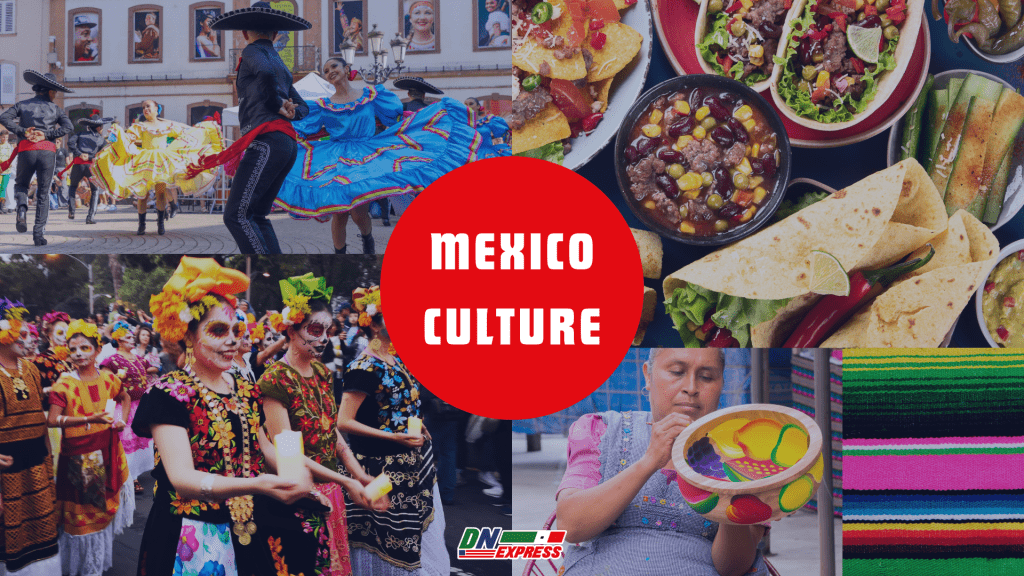
If you've ever looked in the mirror and questioned your cultural identity… you share this experience with many others.
Maybe you've felt caught between two worlds. Maybe you've carried guilt for not knowing the language, or shame for not “looking Mexican enough,” or fear that reclaiming your roots would make you seem fake.
We've heard all of that, and we've helped people like you find a way back.
Thousands of Mexican-Americans have found healing, pride, and peace by reclaiming what was always theirs. Not through perfection. Not through performance.
But through action, through choosing to say: “This is part of who I am.”
Your story isn't broken. It's unfinished.
And if you're ready to feel like you belong again, we're ready to walk that path with you, every step of the way.
Schedule a Free Case Review Call or Message Us on WhatsApp
Let's make your identity official, together. ✨
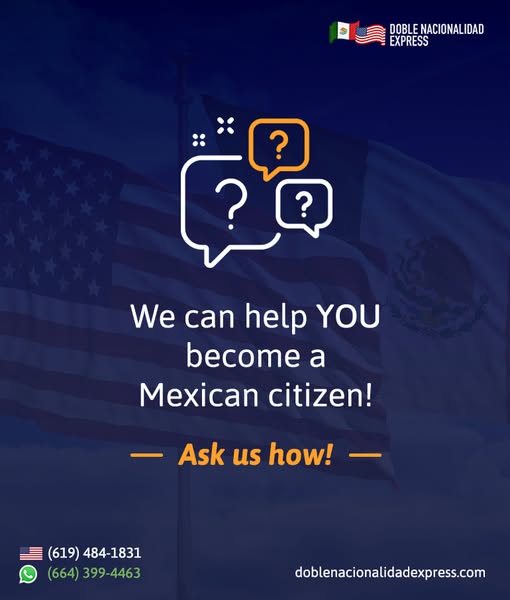
Preguntas frecuentes
What is considered disrespectful in Mexican culture?
Mocking traditions, refusing food when offered, or being dismissive toward elders can come off as rude. Even if you don't understand a custom, showing curiosity and respect goes a long way.
How do people behave in Mexican culture?
Mexican culture is warm, welcoming, and deeply family-centered. You'll often find gatherings are loud, affectionate, and centered around food.
Respect for elders, especially grandparents, is highly valued.
Why do Mexicans avoid eye contact?
In many rural or traditional areas, extended eye contact may be seen as aggressive or confrontational. This doesn't mean rudeness; it's cultural nuance.
Urban environments, especially among younger generations, tend to be more relaxed.
Is thumbs up offensive in Mexico?
No, a thumbs-up gesture is widely understood and generally accepted, similar to the U.S.
What are stereotypes about Mexican culture?
That all Mexicans work manual labor jobs, or that Mexican identity is limited to tacos, tequila, and mariachi. These stereotypes erase the complexity and richness of Mexico's Indigenous roots, regional diversity, and intellectual contributions.
What are the two most significant things in Mexican culture?
Family and tradition. Whether it's honoring Día de los Muertos or cooking tamales for Christmas, rituals that center family are often sacred. Research on Mexican American cultural values consistently identifies familism as a core value.
How is Mexican culture different from U.S. culture?
U.S. society often prioritizes independence and personal achievement. Mexican culture leans on collectivism, the idea that community, family, and shared responsibility come first.
Which culture is similar to Mexican?
There are overlaps with other Latin American cultures like Colombian or Peruvian, especially around language, Catholic traditions, and cuisine, but every culture carries its own flavor, dialects, and history.
What's the difference between Mexicans and Latinos?
“Latino” is a broad term for people from Latin America, including Mexico, Central America, and South America. “Mexican” specifically refers to someone from Mexico or of Mexican descent.
All Mexicans are Latinos, but not all Latinos are Mexican.
Knowing the answers is one thing. Feeling at home in the culture? That's something deeper.
And that's exactly what dual citizenship can help you rediscover.

